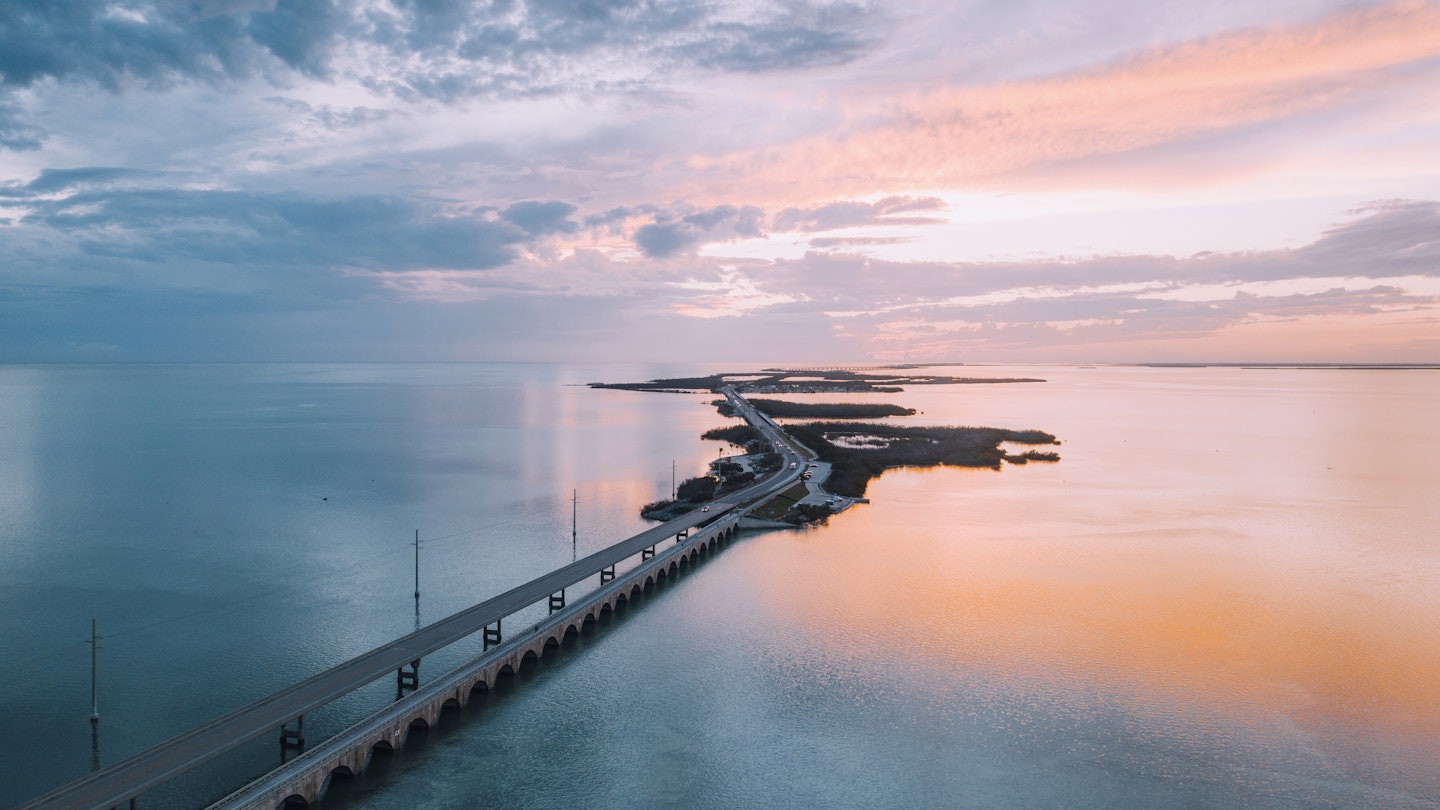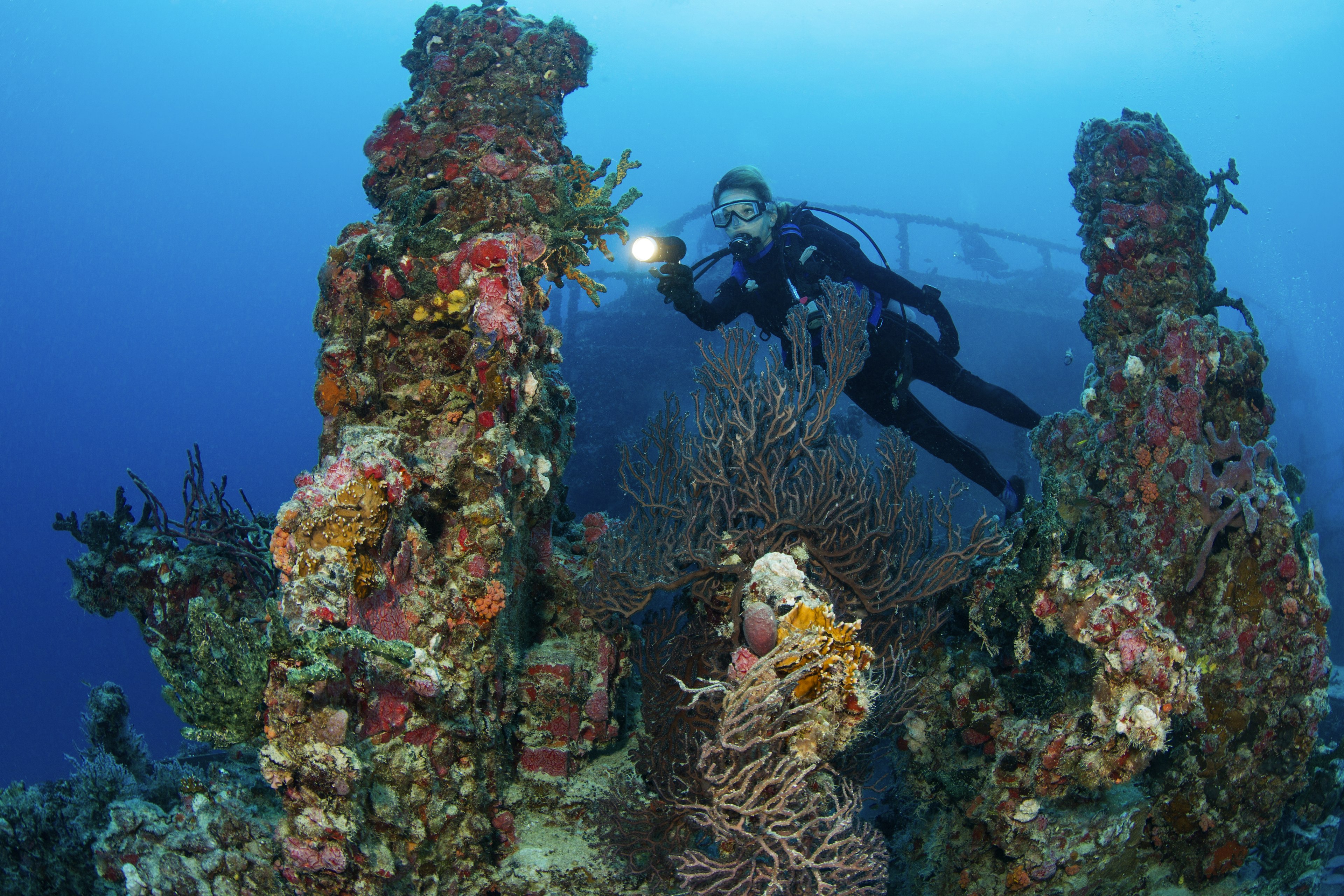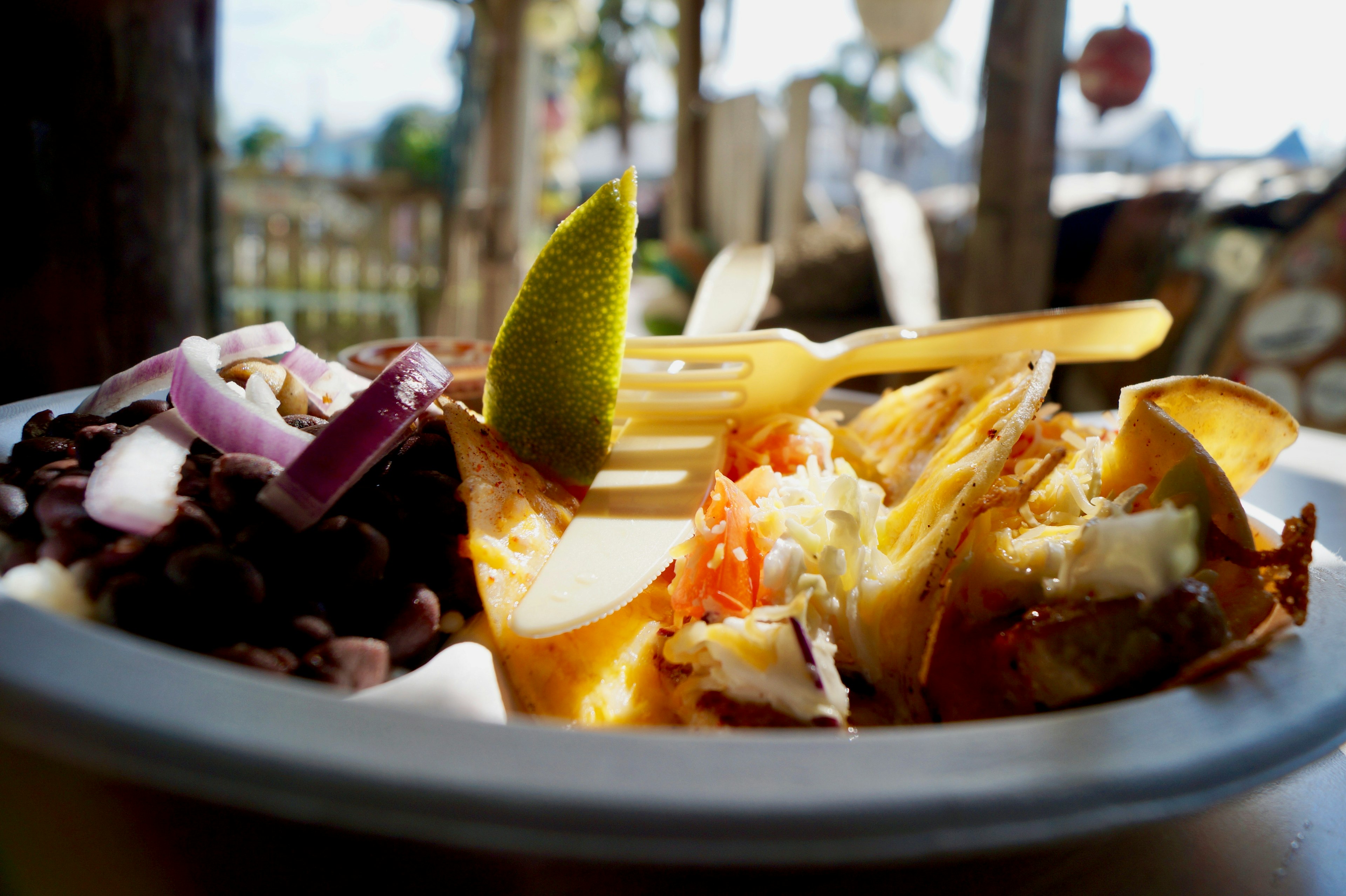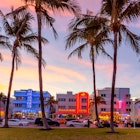
Every island unique: Five one-of-a-kind adventures in the Florida Keys
Sponsored by
Feb 5, 2024 • 7 min read

There are more than 100 islands in the Florida Keys, and each offers its own angle of exploration © Getty Images
It’s easy to think of the Florida Keys as just that – ‘the Keys,’ a singular, undifferentiated destination. But there are more than 100 islands in the Keys, and each offers its own angle of exploration. Here, lets split the Keys into five distinct regions, each with its own theme, all connected by the Overseas Highway.
With that said, don’t think you can only go fishing in Islamorada, or have family fun in Marathon. Every Key is its own island, but there is a spread of attractions across the region that can be enjoyed, more or less, wherever you are. At the least, you’re never that far from the next little stand of mangroves or South Florida eccentricities.

Key Largo: Dive In
About a 90-minute drive from Miami, the northernmost Keys are known as the Upper Keys. Like many of the islands’ towns, Key Largo, which sprawls along the Overseas Highway, feels like a cross between a fishing village and a dedicated coastal resort. It’s also the natural center of gravity for tourism in this neck of the woods.
This is largely due to the presence of John Pennekamp Coral Reef State Park, which turned 60 years old in 2023. Here you’ll have the chance to see filigreed flaps of soft coral, technicolor schools of fish, dangerous-looking barracuda and perhaps massive, yet ballerina-graceful, sea turtles. However, the coral in the Florida Keys is in danger because of disease, careless boaters, and most recently, rising water temperatures due to climate change.
There are efforts to reverse this damage and you can help by being a responsible diver at any of the following locations. To access any of these dive sites, you’ll need to organize excursions through Pennekamp park, or at any of Key Largo’s many dive centers.

Molasses Reef is the most visited coral reef in the state, home to a rainbow of sea life, including some imposing, yet harmless, Goliath Groupers. Because it’s so popular it’s easy to book a trip out to Molasses, but on the other hand, because it’s so popular it’s, well, popular. Casual divers might not mind, but those seeking a more advanced, and less crowded dive site may want to opt for a trip to the Duane and the Bibb, two US Coast Guard Cutters that were intentionally scuttled about a mile south of Molasses Reef. This is an advanced diving site with tons of marine life and visibility, much beloved by locals and visitors alike.
For more challenge (and reward), book an excursion to the USS Spiegel Grove. In fact, you may want to book a few trips here, as most anyone you ask will say this 510-foot wreck (again, intentionally sunk) cannot be experienced in one dive alone. This is another site for advanced divers only, and even someone with a wreck diving certification should not attempt to explore the wreck in its entirety. That said, if you make it out here, you’ll enter what feels like an underwater Manhattan during rush hour; the marine life here is on another level.

Islamorada: Get Hooked
The ‘Village of Islands’ is aptly named – a collection of several islands speckled over the deep teal of Florida Bay. This is where the Keys really start to feel like islands, as opposed to an extension of the Florida peninsula. But Islamorada also tags itself as the sportfishing capital of the world, and that’s no idle boast.
There’s no shortage of fishing charters in Islamorada, and an experienced captain plus a good boat plus some skill (and luck) are the best prerequisites to landing a fishing story you can tell the grandkids. The true iconic monsters like sailfish, blue marlin and swordfish can be found via charters throughout the year; winter is best for sailfish, while warmer months are best for the latter two species.
If you want to feel closer to the water sans a motor, consider kayak fishing in Florida Bay. This is a particularly fine way of ninja-creeping on snook and permit fish, which are themselves some of the most infamously stealthy ghosts of the Flats (shallow, more or less flat bottom fishing areas). You need to be fit for this sort of fishing; if you think paddling can get tiring, try it after fighting a bonefish.

Marathon: Family Fun
Keep heading south in the Keys and you arrive at Marathon, which is basically the halfway point across the islands. Marathon and the Middle Keys are great for families given the presence of user-friendly nature-related activities. Curry Hammock State Park features an easy 1.5-mile walking path through tropical hardwoods and mangrove habitats, as strenuous a ‘hike’ as you’ll find out here. You can also opt for Crane Point, a combination museum of the old Keys and nature preserve that features several acres of rare palm hammock trees. Want a more traditional beach experience? Head to Sombrero Beach, where the white sand and swaying trees look plucked from a postcard.
Older kids/animal lovers will want to pay a visit to the Turtle Hospital, a rehabilitation and education center that houses, heals, and releases injured sea turtles. Visitors can take a 70-90 minute guided tour of the facility, which ends with the chance to feed some of the patients.
Hungry? Start the day with breakfast at The Stuffed Pig; it’s delicious, but fair warning, you’re going to leave pretty stuffed yourself. Locals also love La Niña, where you can load up on Cuban favorites like roasted pork with rice and beans and fried plantains – again, you won’t be leaving this spot hungry.

Big Pine & the Lower Keys: Camp the Keys
Big Pine Key is not the largest of the Florida Keys, but it can feel like the most country island in the archipelago.
As such, it’s a nice spot to pitch a tent (or park the RV). If you’re into either of these options, the Big Pine Resort offers some 10 acres of island acreage for travelers looking to get away from it all. But our favorite camping in the islands is at Bahia Honda State Park, home to one of the largest, and most beautiful beaches in Keys. You’ve got your choice of tent camping or cabins here, but if you want the latter experience, book quickly, as they tend to get grabbed up.
Further down the Overseas Highway, you can also camp at the KOA site on Sugarloaf Key, just a few minutes from Key West. This island may not be quite as rustic as Big Pine, but it’s still a temperate outdoor experience, and it’s a cheap spot to base yourself for exploring Key West.

If you need to load up on some diner-style food before you leave Big Pine, make sure to pop into the Florida Keys Cafe, where the grub is as filling as it is delicious.
Just to the east of Key West is Stock Island, home to shrimp boats that harvest the 'pink gold' of local waters. This is where a lot of Keys locals head for a meal out – you can't escape tourists here, but you'll be rubbing elbows with locals at places like The Docks, where the seafood you eat was likely caught a few hours ago, or Roostica, a wood-fired pizza joint that more than scratches the itch for a good pie. For Cuban and Caribbean food, head to El Mocho, which offers great value for money, or El Siboney, which is enormously popular with locals. Gents, if you need a haircut and a beer, consider getting both at the functionally if wonderfully named Beards & Brews.

Key West: Creative Culture
The Overseas Highway draws to an end in Key West, but the offerings of the islands don’t. Key West is part of the Keys – indeed, it's the most famous island in the chain – but it also feels like a world apart. Yes, people here have historically been fishing and wrecking (salvaging sunken ships), as in the other islands, but for more than a century Key West has anchored its identity as a home for artists, the LGBTQIA+ community, and others seeking acceptance.
A great place to begin accessing Key West’s unique character is at The Studios of Key West, a nonprofit arts center that showcases artist studios scattered throughout three floors (a branch of South Florida’s most famous bookstore, Books & Books, is located here as well). Come around to learn more about the island’s arts, or for regular performances, readings, etc.
The Fort East Martello Museum was (as you may guess from the name) originally designed to be a fort, but its utility as a military installation quickly passed. Instead, it has become a museum of generally funky stuff, showcasing the art and history of the island. When the sun is setting, head out to Mallory Square, at the end of Duval Street, and watch tons of buskers and local artists bring their creative vision to the crowds (or, y’know, watch a dog cross a tightrope. You do you). Finish your time with a meal at Cafe Sole, which blends the flavors of the south of France with South Florida and the Caribbean.
Sponsored by The Florida Keys & Key West
As a travel entertainment and inspirational media outlet, we sometimes incorporate brand sponsors into our efforts. This activity is clearly labeled across our platforms.
This story was crafted collaboratively between The Florida Keys & Key West and Lonely Planet. Both parties provided research and curated content to produce this story. We disclose when information isn’t ours.
With sponsored content, both Lonely Planet and our brand partners have specific responsibilities:
Brand partner
Determines the concept, provides briefing, research material, and may provide feedback.
Lonely Planet
We provide expertise, firsthand insights, and verify with third-party sources when needed.
Explore related stories





 Budget TravelThis is how you visit Key West on a budget and stretch every last cent
Budget TravelThis is how you visit Key West on a budget and stretch every last centJul 17, 2024 • 7 min read




